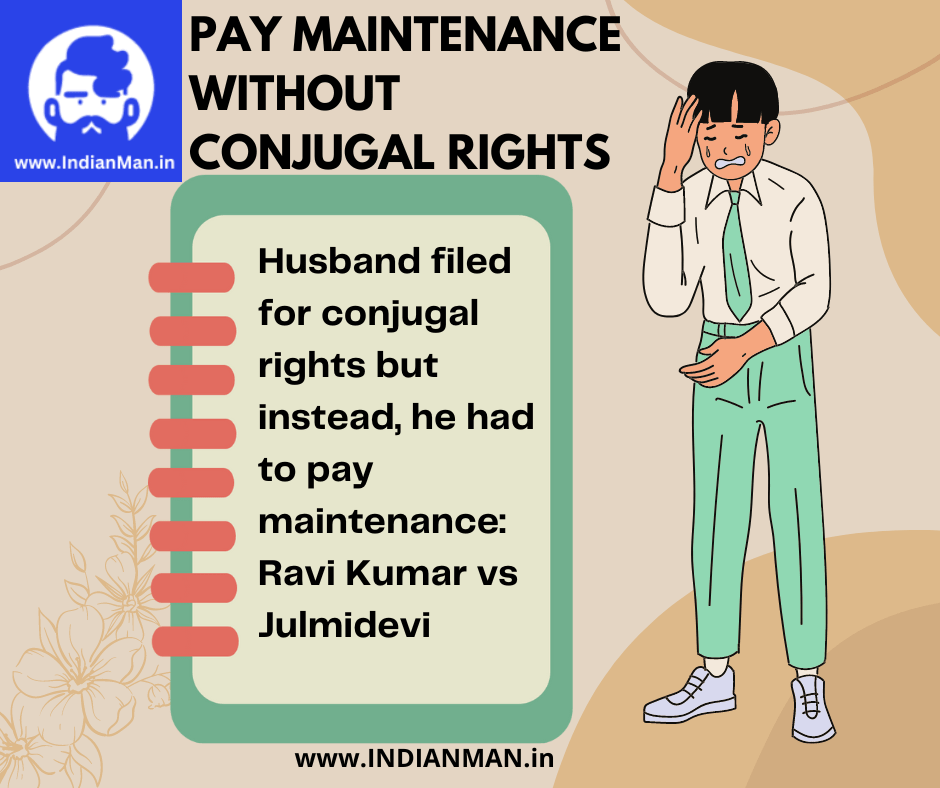Introduction
Indian matrimonial law has faced criticism over its perceived bias against men. One case that brings this issue to the forefront is Ravi Kumar vs Julmidevi ((2010) 4 SCC 476). In this article, we will delve into the details of the case, discuss the challenges faced by men, and explore the need for gender-neutral laws in India. Husband filed for conjugal rights but instead, he had to pay maintenance.
Background of the Case
In Ravi Kumar vs Julmidevi, the husband, Ravi Kumar, filed a petition for restitution of conjugal rights against his wife, Julmidevi. In response, Julmidevi filed a petition for maintenance under Section 125 of the Code of Criminal Procedure (CrPC). The trial court granted maintenance to the wife, prompting the husband to challenge this decision in the Supreme Court.
Supreme Court’s Judgment
The Supreme Court upheld the trial court’s decision to grant maintenance to the wife, even with the pending petition for restitution of conjugal rights filed by the husband. The Court reasoned that maintenance is awarded to ensure that the wife is not left destitute and can maintain a standard of living similar to that enjoyed during the marriage.
The husband’s appeal was dismissed, and the Supreme Court’s ruling emphasized the importance of considering both parties’ circumstances and the need for financial support in determining maintenance.
The Debate on Gender Bias
Critics of the Ravi Kumar vs Julmidevi ruling argue that the judgment exhibits a bias against men, as it focused predominantly on the wife’s claim for maintenance without giving due consideration to the husband’s plea for restitution of conjugal rights.
Others argue that the Court’s decision is in line with the intent of Section 125 of the CrPC, which aims to provide financial assistance to wives who are unable to maintain themselves. They contend that the Court’s ruling is a reflection of the legal framework, rather than an inherent bias against men.
The Need for Gender-Neutral Laws
The Ravi Kumar vs Julmidevi case raises important questions about the need for gender-neutral laws in India. A truly equitable legal system must recognize the rights and responsibilities of both men and women within a marriage. This includes ensuring that maintenance provisions are applied fairly, taking into account the specific circumstances of each case.
Reevaluating the Maintenance Provision
The Ravi Kumar vs Julmidevi case highlights the need to reevaluate the maintenance provision under Section 125 of the CrPC. To ensure fairness, the legal system must establish clear guidelines on when maintenance should be granted and how to appropriately consider both parties’ circumstances.
Conclusion: Striving for Fairness and Equality
The case of Ravi Kumar vs Julmidevi provides an opportunity to reflect on the alleged bias against men in Indian matrimonial law. While some argue that the Court’s ruling demonstrates an unfair focus on the wife’s needs, others contend that it adheres to the legal framework in place.
It is essential for the legal system to continually evaluate and revise its laws to ensure that both men and women are treated fairly and equitably under the law. This includes reexamining maintenance provisions and working towards gender-neutral legislation that acknowledges the rights and responsibilities of both parties in a marriage.




